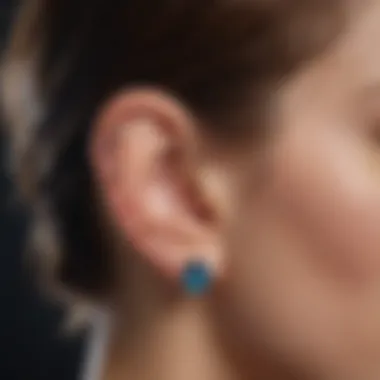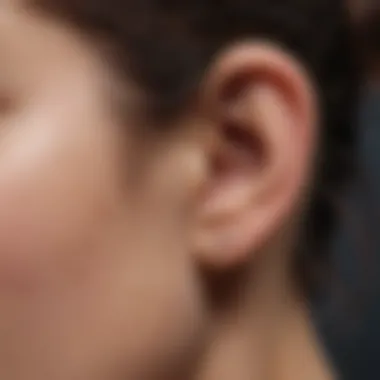Unveiling the Intriguing Link Between Piercings and Migraine Prevention


Fashion Trends
Piercings have been a trend that has soared in popularity over the years, not just for fashion but purportedly for health benefits too. The concept of using piercings to potentially prevent migraines is a fascinating intersection of style and well-being. As fashion trends evolve, individuals are increasingly looking for unique ways to not only express themselves but also improve their quality of life. The idea that a simple piercing could help alleviate the debilitating effects of migraines adds an extra layer of intrigue to the world of fashion and beauty.
Beauty Tips and Tricks
In the realm of beauty, where skincare regimens and makeup tutorials dominate the conversation, the notion of piercings as a migraine-prevention method sparks curiosity. Could a carefully placed earring or piercing truly offer relief from the throes of a migraine attack? While beauty enthusiasts are usually focused on enhancing aesthetics, the potential benefits of piercings in managing migraines introduce a whole new perspective to the beauty industry. Exploring the scientific basis behind this unconventional approach sheds light on the potential synergy between fashion and health.
Celebrity Buzz
Celebrities have always been trendsetters in the world of fashion and beauty, with their style choices closely followed by fans and critics alike. The idea of piercings serving a dual purpose of fashion accessory and migraine prevention method could certainly catch the attention of celebrity circles. Imagine red carpet events where stars proudly flaunt piercings not just for glam but also for potential health benefits. Fashion police reviews may take on a new dimension as they dissect not just the style quotient but also the functional aspect of these unique accessories. Celebrity endorsements could catapult piercings as a mainstream trend with a health twist, blending luxury with practicality in unprecedented ways.
Trend Reports
As street style snapshots capture the evolution of fashion on the ground, the incorporation of piercings for migraine prevention might spark a new trend wave. Beauty product reviews could delve into the intricacies of selecting the right type of piercing for potential health benefits. The forecast analysis of fashion trends may include predictions on how the public will embrace this fusion of style and wellness. By intertwining beauty insights with health considerations, trend reports could pave the way for a paradigm shift in how accessories are viewed and utilized. Piercings may soon become not just a fashion statement but a statement of holistic well-being, bridging the gap between outer beauty and inner health.
Introduction
In this intriguing delve into the possible efficacy of piercings in preventing migraines, we embark on a journey of exploration and analysis. The phenomenon of using piercings as a method for managing migraines holds a unique place in the realm of alternative health practices. By examining this unconventional approach, we aim to offer a fresh perspective on migraine prevention and highlight the significance of considering diverse strategies in healthcare.
Understanding Migraines
The Impact of Migraines on Quality of Life
Migraines, often debilitating and distressing, have a profound impact on the daily lives of individuals suffering from this neurological condition. The relentless pain, sensitivity to stimuli, and disrupted cognitive functions associated with migraines create a significant burden on the overall quality of life. Understanding the extent to which migraines impede personal and professional activities is crucial in appreciating the urgency for effective management strategies. We will delve into the intricate ways in which migraines influence various aspects of individuals' well-being, shedding light on the complexities of this condition.
Common Symptoms and Triggers
The diverse symptoms and triggers of migraines further complicate the landscape of migraine management. From throbbing head pain to nausea and visual disturbances, the range of symptoms experienced by migraineurs underscores the multifaceted nature of this ailment. Identifying common triggers such as stress, hormonal fluctuations, and certain foods is paramount in developing suitable prevention methods. By examining these prevalent symptoms and triggers, we aim to provide a comprehensive overview of the challenges posed by migraines and the necessity for tailored interventions.
Piercings as a Migraine Prevention Method
Historical Background of Piercings for Health Purposes
Piercings have a long-standing history as cultural practices and have been utilized for health purposes in various traditions. The historical significance of piercings in promoting well-being and alleviating ailments traces back to ancient civilizations, where specific piercings were believed to enhance specific bodily functions. Understanding the historical context of piercings provides valuable insights into the evolution of piercing therapy and its modern applications in migraine prevention.
Emergence of Piercing Therapy for Migraines
The emergence of piercing therapy as a potential method for managing migraines has sparked intrigue within the medical community. Anecdotal accounts and preliminary studies suggest a correlation between certain ear piercings and a reduction in migraine frequency and intensity. Exploring the evolution of piercing therapy for migraines offers a glimpse into the intersection of alternative healing practices and conventional medicine, paving the way for innovative approaches to migraine care.


Research Overview
Existing Studies on the Efficacy of Piercings in Migraine Management
A growing body of research has focused on investigating the efficacy of piercings in migraine management. From qualitative surveys to controlled clinical trials, researchers have sought to validate the anecdotal evidence surrounding piercing therapy. Analyzing the findings of existing studies allows us to elucidate the potential benefits and limitations of incorporating piercings into mainstream migraine treatment protocols.
Scientific Theories Supporting the Mechanism of Action
Various scientific theories have been proposed to elucidate the mechanism of action behind piercing therapy for migraines. From the concept of stimulating acupressure points to triggering neurological responses, researchers have explored diverse avenues to unravel the physiological effects of piercings. Investigating these scientific theories sheds light on the underlying principles that may account for the purported effectiveness of piercings in alleviating migraine symptoms.
Types of Piercings and Their Alleged Benefits
In this section, we delve into the intriguing realm of types of piercings and the benefits they are purported to offer in the prevention of migraines. Understanding the significance of different piercing types is crucial in deciphering how they may potentially aid in managing migraine symptoms. By examining the alleged benefits associated with various piercings, we aim to provide a comprehensive overview of this unconventional approach to migraine relief. Exploring the positioning, mechanisms, and historical significance of different piercings sheds light on their potential effectiveness and challenges conventional migraine treatment methods.
Daith Piercing
Anecdotal Evidence vs. Scientific Validation
When considering the efficacy of daith piercings in migraine prevention, it is imperative to distinguish between anecdotal evidence and scientific validation. While anecdotal accounts often highlight personal experiences of individuals attributing migraine relief to daith piercings, scientific validation requires rigorous research and empirical evidence. The juxtaposition of these two perspectives serves as a cornerstone in evaluating the credibility and reliability of daith piercing as a viable migraine management technique. Analyzing the contrast between subjective testimonials and scientific studies elucidates the complexities and controversies surrounding the use of daith piercings for migraine relief.
Pain Tolerance and Healing Process
A critical facet of daith piercings in the context of migraine prevention is understanding the pain tolerance levels and healing process associated with this particular type of piercing. Assessing an individual's tolerance to pain is essential before undergoing the piercing procedure to mitigate potential discomfort or complications. Furthermore, gaining insight into the healing trajectory post-piercing aids in comprehending the temporal aspects of migraine relief attributed to daith piercings. Exploring the intricacies of pain management and the healing journey offers a nuanced perspective on the practical implications and considerations of opting for daith piercings as a migraine preventive measure.
Conch Piercing
Positioning and Potential Effects on Migraines
By delving into the positioning of conch piercings and their potential effects on migraines, we unveil the interconnectedness between piercing placement and migraine alleviation. The strategic positioning of a conch piercing in relation to specific acupuncture points or neural pathways may underpin its purported therapeutic benefits in managing migraine symptoms. Examining the alignment between the physical location of the piercing and its hypothesized impact on migraine frequency and intensity provides a holistic understanding of how conch piercings function within the realm of alternative migraine therapies.
Comparative Analysis with Other Piercings
Conducting a comparative analysis between conch piercings and other piercing types offers valuable insights into the diverse landscape of piercing therapies for migraine prevention. Contrasting the mechanisms and perceived benefits of conch piercings with alternative piercing modalities enriches our comprehension of the varied approaches available to individuals seeking non-conventional migraine management techniques. Evaluating the distinct attributes and outcomes associated with conch piercings enhances the discourse on their comparative efficacy and positions them within the broader spectrum of piercing interventions.
Tragus Piercing
Ear Anatomy and Acupuncture Points
Exploring the relationship between tragus piercings, ear anatomy, and acupuncture points illuminates the intricate connection between physical stimulation and potential therapeutic effects on migraines. Investigating how tragus piercings interact with specific acupoints or nerve clusters in the ear enhances our understanding of their purported impact on migraine symptoms. By dissecting the anatomical nuances of tragus piercings and their influence on the body's energy meridians, we unravel the theoretical foundations supporting this unique approach to migraine management.


User Experiences and Success Stories
Scrutinizing user experiences and success stories related to tragus piercings provides valuable real-world insights into the practical outcomes and subjective perceptions of this piercing technique in managing migraines. Delineating individual accounts of migraine relief post-tragus piercing offers a qualitative dimension to our understanding of the efficacy and limitations of this alternative therapy. By incorporating firsthand narratives and testimonials, we offer a nuanced perspective on the subjective experiences and diverse outcomes associated with tragus piercings as a method for migraine prevention.
Challenges and Controversies
When delving into the avenue of challenges and controversies surrounding the use of piercings for migraine prevention, it becomes imperative to acknowledge the multifaceted nature of this intriguing topic. The significance of addressing these challenges lies in the critical examination of the validity and potential risks associated with such alternative therapeutic methods. By scrutinizing the controversies surrounding piercing therapy, individuals gain a more comprehensive understanding of the complexities and debates within the medical community regarding non-conventional migraine treatments.
Medical Community Perspectives
Evidence-Based Medicine vs. Alternative Therapies
Exploring the dichotomy between evidence-based medicine and alternative therapies within the context of piercing therapy for migraines is fundamental in elucidating the rationale behind medical decision-making processes in this domain. Evidence-based medicine emphasizes the utilization of empirical evidence and scientific research to support treatment modalities, whereas alternative therapies may encompass approaches not rooted in traditional medical paradigms. Understanding the nuances of these contrasting frameworks is vital for evaluating the credibility and efficacy of piercing therapy interventions for migraine management. While evidence-based medicine prioritizes objective data and rigorous scientific methodologies, alternative therapies offer diverse perspectives and unconventional solutions that may challenge conventional medical wisdom.
Risk Factors and Adverse Effects
Delving into the realm of risk factors and adverse effects associated with piercing therapy for migraines unveils the complexities and potential hazards inherent in this non-traditional treatment modality. By assessing the possible risks and adverse outcomes of piercing procedures, healthcare providers and individuals contemplating this option can make informed decisions regarding its suitability and safety. Identifying and mitigating risks associated with piercing therapy is paramount to ensuring patient well-being and preventing unintended consequences that may arise from this alternative therapeutic approach.
Legal and Ethical Considerations
Regulatory Oversight and Professional Guidelines
Navigating the landscape of regulatory oversight and professional guidelines pertaining to piercing therapy for migraines illuminates the compliance requirements and ethical standards that govern this practice. Adhering to regulatory frameworks ensures adherence to established norms and safety protocols, safeguarding the interests of patients and practitioners involved in piercing interventions. Professional guidelines serve as ethical compasses, guiding healthcare professionals and individuals towards responsible decision-making and quality care delivery in the realm of alternative migraine treatments.
Informed Consent and Patient Education
Highlighting the integral aspects of informed consent and patient education underscores the significance of transparency and autonomy in the context of piercing therapy for migraine prevention. Empowering patients with comprehensive information and supporting their informed decision-making processes engenders trust and mutual understanding between healthcare providers and individuals seeking alternative treatment modalities. Educating patients about the risks, benefits, and expected outcomes of piercing therapy enables them to participate actively in their healthcare journey and aligns with principles of patient-centered care and ethical medical practice.
Deconstructing Popular Beliefs
Myths Surrounding Piercings and Migraine Relief
Unpacking the prevailing myths and misconceptions surrounding piercings and their perceived efficacy in migraine relief sheds light on the widespread beliefs and narratives that influence individuals' perceptions of alternative therapeutic interventions. Addressing these myths requires critical examination and scientific scrutiny to distinguish between anecdotal accounts and empirical evidence supporting the efficacy of piercing therapy for migraines. Challenging misconceptions with factual information and evidence-based insights is essential for fostering informed decision-making and dispelling unfounded beliefs that may impact treatment outcomes.
Placebo Effect and Psychological Influences
Exploring the intricate interplay between the placebo effect and psychological influences in the context of piercing therapy illuminates the psychosocial dynamics that contribute to individual experiences and treatment responses. The placebo effect, characterized by the phenomenon where a placebo elicits a therapeutic response due to psychological factors rather than its intrinsic properties, underscores the importance of considering psychological influences in assessing treatment outcomes. Understanding how beliefs, expectations, and subjective perceptions influence the outcomes of piercing therapy for migraines enhances our grasp of the holistic factors shaping individuals' responses to alternative migraine treatments.
Future Research Directions


Introduction
In the realm of exploring the efficacy of piercings in preventing migraines, the facet of Future Research Directions emerges as a crucial avenue for further investigation and advancement. Illuminating the path ahead in this intriguing domain, Future Research Directions not only promises to deepen our understanding but also holds the potential to revolutionize migraine management strategies. With a keen eye on propelling knowledge and innovation, researchers are poised to uncover new insights that may reshape the current landscape of migraine therapies.
Clinical Trials and Longitudinal Studies
Standardized Protocols and Outcome Measures
Venturing into the realm of Standardized Protocols and Outcome Measures within the context of this article presents a pivotal stride towards enhancing the reliability and comparability of research outcomes. By delving into the specifics of Standardized Protocols and Outcome Measures, researchers can establish a cohesive framework that standardizes methodologies and assessment criteria. This standardized approach not only streamlines data collection and analysis but also fosters a more robust foundation for drawing evidence-based conclusions. The hallmark characteristic of Standardized Protocols and Outcome Measures lies in its structured and uniform data gathering process, ensuring consistency and accuracy across diverse research endeavors. While its inherent rigidity may pose challenges in accommodating nuanced variables, the benefits of increased methodological precision and result reliability render it a favored choice for steering the discourse on piercing therapy for migraines.
Collaborative Efforts in Investigating Piercing Therapy
Embracing the collaborative ethos in investigating Piercing Therapy can exponentially enrich the depth and breadth of knowledge in this domain. By pooling diverse expertise and resources under the umbrella of collaborative research initiatives, stakeholders can synergize efforts to explore the multifaceted aspects of piercing therapy for migraine prevention. A key characteristic of Collaborative Efforts in Investigating Piercing Therapy lies in its capacity to bridge disciplinary boundaries and cultivate a holistic understanding of the subject matter. The collaborative approach not only promotes knowledge exchange and cross-pollination of ideas but also accelerates the pace of scientific discovery by leveraging synergistic strengths. While challenges such as coordinating disparate schedules and aligning research objectives may arise, the advantages of shared insights and collective problem-solving underscore its paramount importance in advancing the frontiers of piercing therapy research.
Innovations in Piercing Techniques
Customized Approaches for Individual Patients
Entering the domain of Customized Approaches for Individual Patients injects a personalized touch into the discourse on piercing therapy efficacy for migraines. By tailoring interventions to individual needs and preferences, practitioners can offer bespoke treatment regimens that address unique patterns and characteristics of migraine manifestations. The hallmark characteristic of Customized Approaches lies in its flexibility and adaptability, allowing for tailored solutions that resonate with the nuanced profile of each patient. While the intricate nature of customizations may require additional time and resources, the advantages of enhancing treatment efficacy and patient satisfaction position it as a valuable choice for optimizing piercing therapy outcomes.
Integration of Piercing Therapy in Mainstream Medicine
Navigating the landscape of Integration of Piercing Therapy in Mainstream Medicine heralds a paradigm shift in the perception and utilization of piercing therapy for migraines. By assimilating piercing techniques into conventional medical practices, practitioners can harness the synergistic benefits of complementary therapies to augment migraine management protocols. The key characteristic of Integration lies in its dual-pronged approach that harmonizes traditional medical interventions with unconventional modalities, offering patients a comprehensive and integrative treatment spectrum. While resistance from traditional medical establishments and regulatory hurdles may impede seamless integration, the potential advantages of expanding treatment options and catering to diverse patient preferences underscore its significance in reshaping the therapeutic paradigm for migraines.
Conclusion
Key Takeaways
Balancing Anecdotal Evidence with Scientific Rigor:
When considering the efficacy of piercings in migraine management, finding a balance between anecdotal evidence and scientific rigor is crucial. While anecdotal reports often highlight personal experiences of migraine relief through piercings, scientific validation plays a significant role in substantiating these claims. By striking a balance between these two aspects, researchers and healthcare professionals can better navigate the realm of alternative therapies for migraines, providing a more comprehensive understanding of the potential benefits and limitations associated with piercing therapy.
Implications for Personalized Healthcare:
The exploration of piercings as a migraine prevention method not only introduces a unique approach to managing migraines but also opens doors to personalized healthcare interventions. By recognizing the individualized nature of migraine experiences and responses to treatments, the implications for personalized healthcare become apparent. Tailoring migraine management strategies, including the consideration of piercing therapy, to the specific needs and preferences of each patient can lead to more effective and patient-centered care, ultimately improving outcomes and quality of life.
Closing Remarks
The Ongoing Debate on Piercings and Migraine Prevention:
The ongoing debate surrounding the use of piercings for migraine prevention reflects the ambiguity and complexity of this topic. While some advocate for the potential benefits of piercings in alleviating migraine symptoms, others approach this concept with skepticism and caution. This debate underscores the importance of continued research, critical analysis, and open dialogue to further elucidate the role of piercings in migraine management, paving the way for informed decision-making in clinical practice.
Encouraging Dialogue and Further Exploration:
Encouraging dialogue and further exploration of piercings as a migraine prevention method is essential in advancing scientific understanding and patient care. By fostering discussions that incorporate diverse perspectives, experiences, and expertise, the landscape of migraine management can evolve, leading to innovative approaches and enhanced outcomes. Embracing collaboration and curiosity in exploring the intersection of piercings and migraines is key to realizing the full potential of this unconventional yet intriguing therapeutic avenue.















